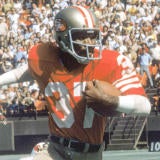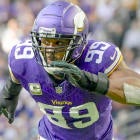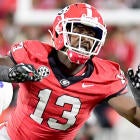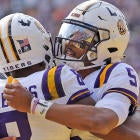GREEN BAY, Wis. -- The words come in rapid fire, some actually meaning something, others not a thing, those the dummy calls aimed to confuse the opposition. It is a football symphony at the line of scrimmage, with each guy playing a role, and precision being of the utmost importance.
This is the secretive world of what goes on before the ball is snapped for the NFL's best offense, the Green Bay Packers, led by the league's best quarterback: Aaron Rodgers.
Long gone are the days of a play coming in with a messenger guard or a simple signal from the sidelines, the quarterback then coming to the line, making an adjustment or two, and snapping the football. The exotic looks of the new-wave defenses and the fast-paced play of the Green Bay offense have taken the pre-snap happenings to a new level at the line of scrimmage.
With microphones now placed on the guards or that boom mike for big games also picking up the sounds of the game, we have been taken onto the field with them, given a peek into the cacophony of what Aaron Rodgers and his offense do in their pre-snap world, even if it's hard to decipher for the average ear. The importance of this area for the Packers is not lost on the man who coaches them, which is why this part of the game is so intriguing.
"You should never lose a play at pre-snap," Packers coach Mike McCarthy said. "That's bad coaching if you do."
Which is why the 18 seconds or so at the line of scrimmage before the snap -- sometimes it's longer, sometimes shorter, depending on pace -- are so key to what offenses do, but especially so for the Packers. They love to play fast, which means the action at the line of scrimmage is even more important than it is for most other offenses.
It is a world filled with code words, quick-reactionary decisions and a constant stream of strategy right up until the ball is snapped.
"It's a conversation between a few guys on every play," Packers guard Josh Sitton said. "It's not always calm and cool. When the play clock is running down, it can get a little hectic."
Like a real symphony, it takes a ton of practice. If somebody is off-key, the thing might not work, even if the rest of the group hits all the notes. Even then, that's just the cerebral part, before it turns into a physical battle, where power and strength and speed takes on a bigger role than what's going on inside the mind.
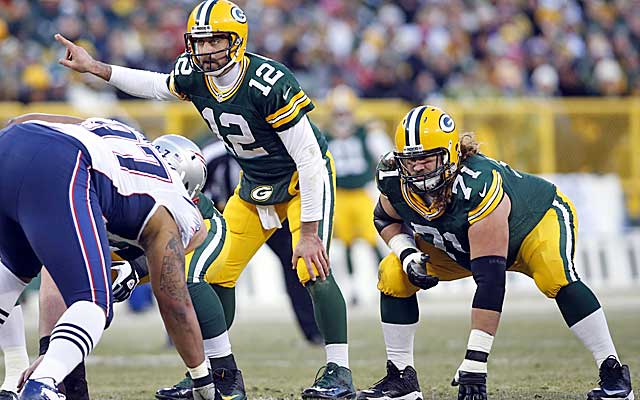
Here's how it all works.
The rehearsals
Nothing the Packers do on Sunday, as with any team, would work without the practice, the reps and all the mental gymnastics.
"The majority of the stuff that happens in the game already happened during the week," Rodgers said. "We play like we practice. It's not like we make stuff up in the moment. We talk about the checks. We talk about the dummy calls. We talk through everything."
With practice time limited, it means more of an emphasis on classroom preparation for the pre-snap part of the game. In the week leading up to a game, the group comes up with dummy calls, different words for real calls, and they work through them on the practice field, but also must have them ingrained in their mind. One misstep could mean the franchise passer getting a helmet to the chin (yes, 15 yards, but you get the point).
"It's drilled every day," McCarthy said. "The moving target for us is always communication. That's always changing. The words change a lot, so it's good for players to come up with words for calls and dummy calls. It's like if you had one called "Prisco." You would remember that, wouldn't you?"
That's right, there are words for real calls and fake ones. "Sixty-five percent of the calls are dummy calls," McCarthy said. "The guys have fun with that."
The dummy calls are important because of all the new technology. Opposing teams listen in to TV tapes to hear the quarterback and linemen make their calls. In recent years, the TV tapes exchanged by the teams have been stretched to include that part of the game on the tape, something that has rubbed several coaches and quarterbacks the wrong way.
"With the new microphones on the guards, and the nationally-televised games with the low camera and the mike, it picks up a lot of stuff," Rodgers said. "You are constantly changing what words are live and what words are dead. You know the D is watching that for words and cadence, so we have to change it all the time. That part is stupid. It's too much access. Fans like it, so the NFL will keep doing it."
"When they put the mikes on the guards, the whole game changed in the communication area," McCarthy said. "You have to constantly change things."
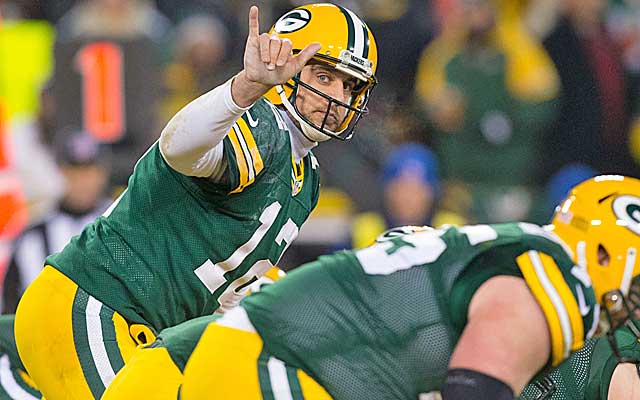
McCarthy doesn't run the offense anymore, stepping away as play-caller, so last week while watching practice he heard an unfamiliar word as a call by one of his: Desk.
"What the hell is that?" he asked. "It was something new the players were using. I didn't know."
Don't lock in on that one. It isn't going stay that way. Not with the mikes around.
The band's big horns
When the Packers are going no-huddle, Rodgers makes the play calls and formation calls at the line of scrimmage. It's at that time that the symphony truly begins, starting with the big horns, or in this case, the big guys up front.
The interior three of the Green Bay line is so important to what they do pre-snap. Center Corey Linsley started 16 games as a rookie last season, all the while making line calls in one of the most complicated pre-snap offenses in the league. His first start came on the road at Seattle, the toughest place for an offense to communicate.
"There's a lot going on with what we do," Linsley said. "It's really complex."
When Linsley scans the defense after Rodgers makes the play call, he will makes his line calls to identity the blitzers, set protections and decide which way and how the line will block. If you watch closely, even without the sound, you can see him pointing and communicating with the rest of the line along with Rodgers.
Linsley, although inexperienced, makes the first call. Then guards Josh Sitton and T.J. Lang, veterans who Rodgers said have "high football IQS," will then counter or offer suggestions about what they like. All the while they are barking out some dummy calls. Words that matter, and some that don't.
"It can get hectic," Linsley said. "I'll say we should go over here, and they'll say why not over here. But the words are brief. We use different words for different calls. I have two veteran guys who have been around a long time playing next to me, which really helps."
Or as McCarthy said: "He's got sideboards that are awesome. Everything the centers do, the guards are trained to do. We train them all the same."
As a rookie Linsley wasn't too apt to overrule his guards. But he did once when Lang suggested something different from his initial call.
"One time, and T.J. was right," Linsley said. "I didn't do that again."
"I told him to never not listen to us again," Sitton said. "He didn't do too much wrong."
With the line calls made, the focus shifts back to Rodgers.
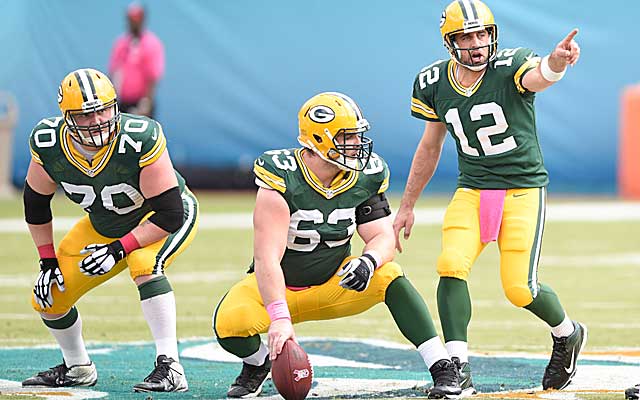
The maestro
Even if Linsley and the guards suggest a blocking scheme up front, Rodgers is the man who has final say and the guy who runs the whole show. He is a master at it.
"He has the trump card," McCarthy said. "Our guy is unique in that we've given him full reign of all the adjustments at the line of scrimmage."
"It has to be that way," Rodgers said. "I need to be comfortable with the final word."
It's hard to put a clock on the process, because pace changes series by series for the Packers, but it goes something like this, according to McCarthy:
Rodgers calls the play and the formation at the line, followed by the line calls made by the inside three. Rodgers can then call an audible to change the play -- sometimes, they are also dummy calls -- or stick with the original. He can also change the line calls for the first play, and his word is final. No arguing.
The challenge now for the Packers has been the way teams have started to defend their no-huddle offense.
"For a while the last few years, when the offense went up-tempo, teams were a little more simple on the back end," Rodgers said. "They are now more intricate in what they do against the no huddle, up-tempo. We speed it up now and we get more exotic (defensive) calls. Now it's how do we combat that?"
All this makes what is done in those 18 seconds or so key in the no-huddle offense. The dialogue and the pointing are being done sometimes even as the ball is snapped. I asked Rodgers what it would be like if somebody were put in the middle of it.
"There's a couple of languages going on out there," Rodgers said. "You'd have to try and decipher it. It's a quarterback language and an offense language. There's a lot."
Fullback John Kuhn is also a big part of the calls since he is key in leading the run plays and also big in blitz pickups on passing plays.
"You would think it's a different language we are speaking," Kuhn said. "It's kind of like poker, too. We make a call, the defense makes a call and you have to make another call to combat that. Sometimes the first call is fake to make them make a call. Sometimes it's real. It's a cat-and-mouse game out there."
Oh, and then the ball is snapped. A play is run, and then they get to do it all over again.







